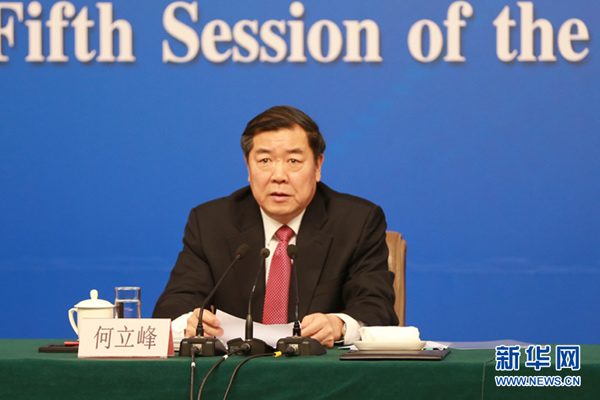當(dāng)前位置: Language Tips> Focus 專題> 2017全國兩會> 兩會熱詞
分享到
3月6日,國家發(fā)展和改革委員會主任何立峰、副主任張勇、副主任寧吉喆就“經(jīng)濟(jì)社會發(fā)展與宏觀調(diào)控”的相關(guān)問題回答中外記者提問時表示,今年去產(chǎn)能仍然是供給側(cè)結(jié)構(gòu)性改革重點(diǎn)任務(wù)之首,范圍將擴(kuò)大到煤電。
 |
|
3月6日,十二屆全國人大五次會議舉行記者會,邀請國家發(fā)展和改革委員會主任何立峰、副主任張勇、副主任寧吉喆就“經(jīng)濟(jì)社會發(fā)展與宏觀調(diào)控”的相關(guān)問題回答中外記者的提問。圖為何立峰在發(fā)布會上回答記者提問。新華網(wǎng)/中國政府網(wǎng) 傅義洲 攝 |
China will further reduce excessive steel and coal production capacity and extend capacity cutting efforts to energy sectors this year, a senior official with the nation's top economic planning body said on Monday.
發(fā)改委官員6日表示,今年我國將繼續(xù)去除鋼鐵和煤炭行業(yè)多余產(chǎn)能,并將去產(chǎn)能范圍擴(kuò)大到能源行業(yè)。
China plans to slash 50 million tons of steel capacity and 150 million tons of coal capacity, and eliminate or postpone the building of 50 million kilowatts of coal-fired power generation capacity this year.
今年要再壓減鋼鐵產(chǎn)能5000萬噸左右,退出煤炭產(chǎn)能1.5億噸以上。同時,要淘汰、停建、緩建煤電產(chǎn)能5000萬千瓦以上。
去產(chǎn)能(reduce excessive capacity),即化解產(chǎn)能過剩,是指為了解決產(chǎn)品供過于求(supply exceeding demand)而引起產(chǎn)品惡性競爭的不利局面,尋求對生產(chǎn)設(shè)備及產(chǎn)品進(jìn)行轉(zhuǎn)型和升級(transform and upgrade manufacturing facility and products)的方法。
在英文報道中,“去產(chǎn)能”還可以用cut/slash overcapacity表示,比如,政府工作報告中提到的有關(guān)供給側(cè)結(jié)構(gòu)性改革(supply-side structural reform)的幾項(xiàng)措施“去產(chǎn)能、去庫存、去杠桿、降成本、補(bǔ)短板”(cutting overcapacity, destocking, deleveraging, reducing costs and identifying growth areas)。
發(fā)改委記者會其他要點(diǎn):
China has invested more than $50 billion in countries along the Belt and Road since the nation proposed the initiative in 2013. The Initiative has won support from over 100 countries and international organizations, with nearly 50 cooperation agreements signed between governments.
2013年提出“一帶一路”倡議以來,中國對沿線國家的對外投資已經(jīng)超過了500億美元。倡議已經(jīng)得到了世界上100多個國家的響應(yīng),我們已經(jīng)先后和沿線國家簽訂了將近50份的政府之間的合作協(xié)議。
China is in a favorable position in achieving its goal of keeping consumer inflation at around 3 percent this year.
今年CPI漲幅預(yù)期目標(biāo)3%左右,實(shí)現(xiàn)這個目標(biāo)是有很多有利的條件。
China faces heavier price rise pressure caused by rising prices of commodities in the international markets this year, but the country will deepen price reform and, in particular, make efforts to cut and stabilize prices in such sectors as power, transportation and medical services.
今年,由于國際市場商品價格上漲,我們面臨較大漲價壓力。不過,我們會繼續(xù)深化價格改革,打好電力、醫(yī)療、交通運(yùn)輸?shù)戎攸c(diǎn)領(lǐng)域價格改革的攻堅(jiān)戰(zhàn)。
(中國日報網(wǎng)英語點(diǎn)津 馬文英)
分享到
關(guān)注和訂閱

關(guān)于我們 | 聯(lián)系方式 | 招聘信息
電話:8610-84883645
傳真:8610-84883500
Email: languagetips@chinadaily.com.cn